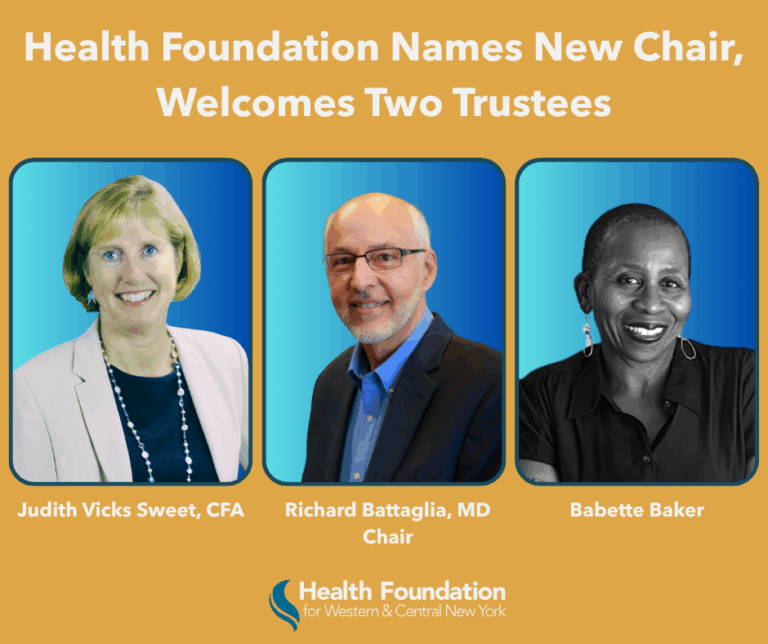The Health Foundation for Western and Central New York submitted the following written testimony to the Feb. 25, 2021 Joint Legislative Budget Hearing on Health and Medicaid.
The Health Foundation for Western & Central New York appreciates the opportunity to submit written testimony for the 2021 New York State Legislative Budget Hearing on Health. The Health Foundation serves communities represented by Sens. Griffo, Helming, Mannion, May, Oberacker, O’Mara, Ritchie and Tedisco in central New York, and Sens. Gallivan, Kennedy, Ortt, Rath, and Ryan in western New York.
The Health Foundation’s vision is a healthy central and western New York where racial and socioeconomic equity are prioritized so all people can reach their full potential and achieve equitable health outcomes. It is greatly important that the state budget prioritizes services and programs that support the health and well-being of all people in our community.
-
- We applaud the proposed decrease in patient medical debt interest rates from 9 percent to the current 1-year Treasury rate. Overwhelming medical debt has a devastating and disproportionate impact on New York residents. For example, twenty percent of residents in Onondaga Country have medical debt appear on their credit reports. Of that 20 percent, 40 percent are people of color. Many people forgo necessary and preventative health care services because of a fear of medical debt. This interest rate decrease is a step toward addressing the racial and socioeconomic gap in health care access and affordability. We also support further measures such as greater transparency in hospital billing, and development of statewide standards that help ensure everyone who is eligible for hospital billing assistance is able to access it.
-
- We call for the global Medicaid cap to be adjusted to more effectively meet the health care needs of New York residents. The cap does not adequately allow for funding increases due to economic downturns such as the one we have experienced during the pandemic. Approximately 700,000 new Medicaid enrollments occurred between March and November 2020 as many people lost their employer-sponsored health insurance. This means the program did exactly what it was intended to do; act as a safety net for those who lost access to health care.Despite these increases in Medicaid enrollment, New York State held Medicaid spending growth to an average of 3.1 percent, lower than 28 other states. This demonstrates how the global cap results in, functionally, a “block grant” system for Medicaid. Instead, we need a system that provides the health care that people need without arbitrary limits.
-
- We strongly support an increase in funding for health care navigator programs to help people enroll in and renew health coverage. We are disheartened to see that currently, there is no funding increase for navigator programs in the budget, and that there has not been a cost-of-living increase for this program since 2013. Hundreds of thousands of New York residents lost their employer-sponsored health coverage over the past year. Many people are eligible for state-sponsored coverage, but need assistance with enrollment. Funding for navigator programs must be increased to ensure more New Yorkers can access the health coverage they are eligible for and deserve.Our April 2019 report produced in partnership with United Hospital Fund, Reaching the Five Percent, detailed how beneficial these navigator programs can be. “When my navigator said I was approved, I was literally in tears, and I hugged every single person here,” said one 37-year-old participant.
-
- We advocate for universal, affordable health care for all people in New York, regardless of citizenship status. High quality, affordable health care is a human right, but there are approximately 400,000 New Yorkers who are excluded from health coverage because of their immigration status. Undocumented people have little to no opportunities for health coverage and may hesitate to pursue other means of care (such as community health centers) out of fear of detainment or retribution. Therefore, we support current legislative efforts that build on pandemic-related coverage expansions and enable undocumented residents to enroll in the Essential Plan.
-
- Medicaid coverage should be extended for up to three years for eligible new mothers. Maternal health disparities are an ongoing crisis across the country, with a disproportionate impact on Black women. Prior research has shown that expanding Medicaid can help improve outcomes for both new mothers and their babies, but currently New York State provides coverage to mothers for only two months after giving birth—hardly enough time for even otherwise healthy people to recover physically from pregnancy and labor. Ensuring new mothers have extended Medicaid coverage would have a major impact on the physical and mental health of both mothers and their children.
-
- While we continue to endure unprecedented health and financial crises, it is imperative that we protect those health care facilities that serve low-income patients. Safety net hospitals and Federally Qualified Health Centers (FQHCs) must be exempt from the proposed 1 percent across-the-board Medicaid funding cuts. We also are opposed strongly to the proposed 340b pharmacy carve-out, as it has the potential to hurt community health centers and other safety net providers and decrease the quality of care for the most vulnerable patients.
-
- Rural communities experience a number of health disparities due to geographic or socioeconomic barriers, as well as lack of comprehensive access to health networks and physicians. This has only been exacerbated by the COVID-19 pandemic. We urge you to restore funding for Rural Health Networks in New York State in order to ensure health care providers can more effectively meet the needs of people in rural communities.
-
- We advocate for restoring funds that were cut for recruitment and retention of home care workers. It is well known that New York State has a growing aging population that will require an adequate investment in resources to address the anticipated growing need for long-term care services. Unfortunately, the governor’s executive budget proposes a 25 percent cut to worker recruitment and retention funding of home care workers in addition to the cuts implemented in 2020-21. The pandemic has only underscored the importance of a strong network of home care providers. Restoring these funds will help ensure these networks have the capacity to meet the needs of older adults and people with disabilities who receive care at home.
Thank you for your consideration, and for the opportunity to share our thoughts on these truly urgent issues.
Nora OBrien-Suric, PhD
President, Health Foundation for Western & Central New York


